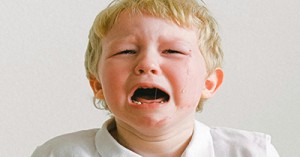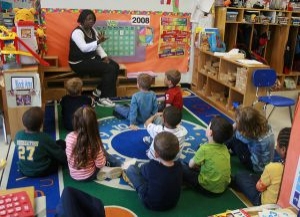As a parent, your behavioural expectations of your child can be higher than what is actually developmentally appropriate for your child's age.
A child at the age of one year old is unlikely to understand and learn discipline whereas a child of three years of age is highly likely to have a better understanding of their behaviour and the consequences of their misbehaviour.
Ages and Stages of Behaviour
Developing an understanding on stages of behaviour is important as this determines how your child's behaviour and understanding is developing typically for their age. It will also provide you to be considerate when dealing with your child’s behaviour if you understand what is expected of them and deal with it accordingly.
Infants (0 - 12 months)
- No understanding for consciously intentional behaviour. For example, when your infant finds your lipstick or a marker, they would begin to draw on their face, the walls, the floor. Your infant doesn't understand that this is unacceptable behaviour, they are just exploring.
- No understanding of conscious reactions during interactions. For example, when interacting with your infant you may notice them grabbing toys from you or other babies. This is because your infant is unable to understand the concept of sharing at this stage.
- Will cry to express needs since they cannot verbally communicate with you. It’s normal for infants to cry to get your attention as a way to say something to you.
- Uses actions to communicate likes or dislikes. For example, if your infant doesn't like a specific food they will spit it out. However if they like a particular food they will show excitement by waving their arms, smiling and kicking their legs.
Strategies to Support Behaviour:
- Establish a familiar routine
- Use distraction when re-directing behaviour. For example, if your infant is trying to grab onto something that you don’t want them to call out to grab their attention or give them a toy instead.
- Set limits when necessary. For example, if they like to pull your hair, stop them by doing it by gently holding their hands and firmly saying stop.
Babies (12 months - 24 months)
- Begins to explore cause and effect relationships (when you are hungry, you eat).
- Still does not consciously plan actions or have control.
- Does not have the capacity to understand, remember or obey rules.
- Sharing is developmentally incompatible at this stage.
- Begins to become interested in other children.
- Beginning to develop independence.
- Starts to test boundaries and able to do things considered “naughty” or “destructive”.
Strategies to Support Behaviour:
- Avoid using no and don’t all the time.
- Provide positive encouragement.
- Ignore minor misbehaviours.
Toddlers (2 - 3 years)
- Becomes easily frustrated when things don't turn out as expected.
- Begin to test the limits of their behaviour.
- May throw tantrums.
- Establishes friendships.
- Becomes independent and finds own limits.
- Wanting to please adults.
- Will follow rules to please adults.
- Able to follow simple rules.
- Beginning to comprehend the relationship between actions and consequences.
Strategies to Support Behaviour:
- Have clear, simple rules
- Praise good behaviour
- Be consistent in managing behaviour. Use the same technique rather that a different one each time.
Preschoolers (4 - 5 years)
- Asks questions constantly and becomes more critical.
- Compares selves to others.
- Make simple judgements (good/bad, win/lose).
- Begins to understand consequences of their behaviour.
- Uses words to hurt others.
- Needs encouragement to support self-esteem.
- Consciously aware of their own interests and intentions.
- Begins to manipulate ideas in their minds.
- Able to make appropriate decisions before acting.
- Can talk through things in a simple manner.
- Learns how to be a friend.
- Becomes very competitive.
- Able to make appropriate decisions before acting.
- Can talk through things in a simple manner.
Strategies to Support Behaviour:
- Explain what you want your child to do and why.
- Don’t give too many orders.
- Praise your child and tell them why.
When dealing with your child’s behaviour no matter how frustrating it may be to handle never physically or verbally abuse your child. There are always other methods to use even though a “smack” at the time may be the easiest option. As adults we don’t go around smacking each other every time we do something wrong so same goes for your child.
By using these milestones, you can begin setting appropriate expectations and limits when managing your child's behaviour.







 Working as a childcare professional can be a challenge especially when dealing with behavioural problems which may arise. The techniques we use when dealing with
Working as a childcare professional can be a challenge especially when dealing with behavioural problems which may arise. The techniques we use when dealing with There are different types of behaviour that children can display and sometimes it can be hard to manage, especially if a child is having behavioural
There are different types of behaviour that children can display and sometimes it can be hard to manage, especially if a child is having behavioural As a parent, your behavioural expectations of your child can be higher than what is actually developmentally appropriate for your child's age.
As a parent, your behavioural expectations of your child can be higher than what is actually developmentally appropriate for your child's age.
 As Educators, there will be many instances where you will need to write about a child's behaviour. For a behaviour management plan, assessments, half-yearly or
As Educators, there will be many instances where you will need to write about a child's behaviour. For a behaviour management plan, assessments, half-yearly or As Educators when communicating with Parents (through verbal or non-verbal communication), there will be times where we need to discuss issues or concerns that may
As Educators when communicating with Parents (through verbal or non-verbal communication), there will be times where we need to discuss issues or concerns that may Challenging Behaviour is when a child does something that hurts themselves and/or other people.
Challenging Behaviour is when a child does something that hurts themselves and/or other people.
 As part of your child's development it is normal for your child to have anxiety and fears. A baby commonly shows a fearful sign to
As part of your child's development it is normal for your child to have anxiety and fears. A baby commonly shows a fearful sign to It's always difficult to bring up behavioural issues with parents, it can be nerve wrecking to tell a parent that their child misbehaves but that
It's always difficult to bring up behavioural issues with parents, it can be nerve wrecking to tell a parent that their child misbehaves but that All children deal with anger on a daily basis. Thinking about it as a child, there is a lot to be angry about. Elder people
All children deal with anger on a daily basis. Thinking about it as a child, there is a lot to be angry about. Elder people It is important to understand that your child behaviour problems could not just be from attention seeking. There are many factors to take into consideration
It is important to understand that your child behaviour problems could not just be from attention seeking. There are many factors to take into consideration


